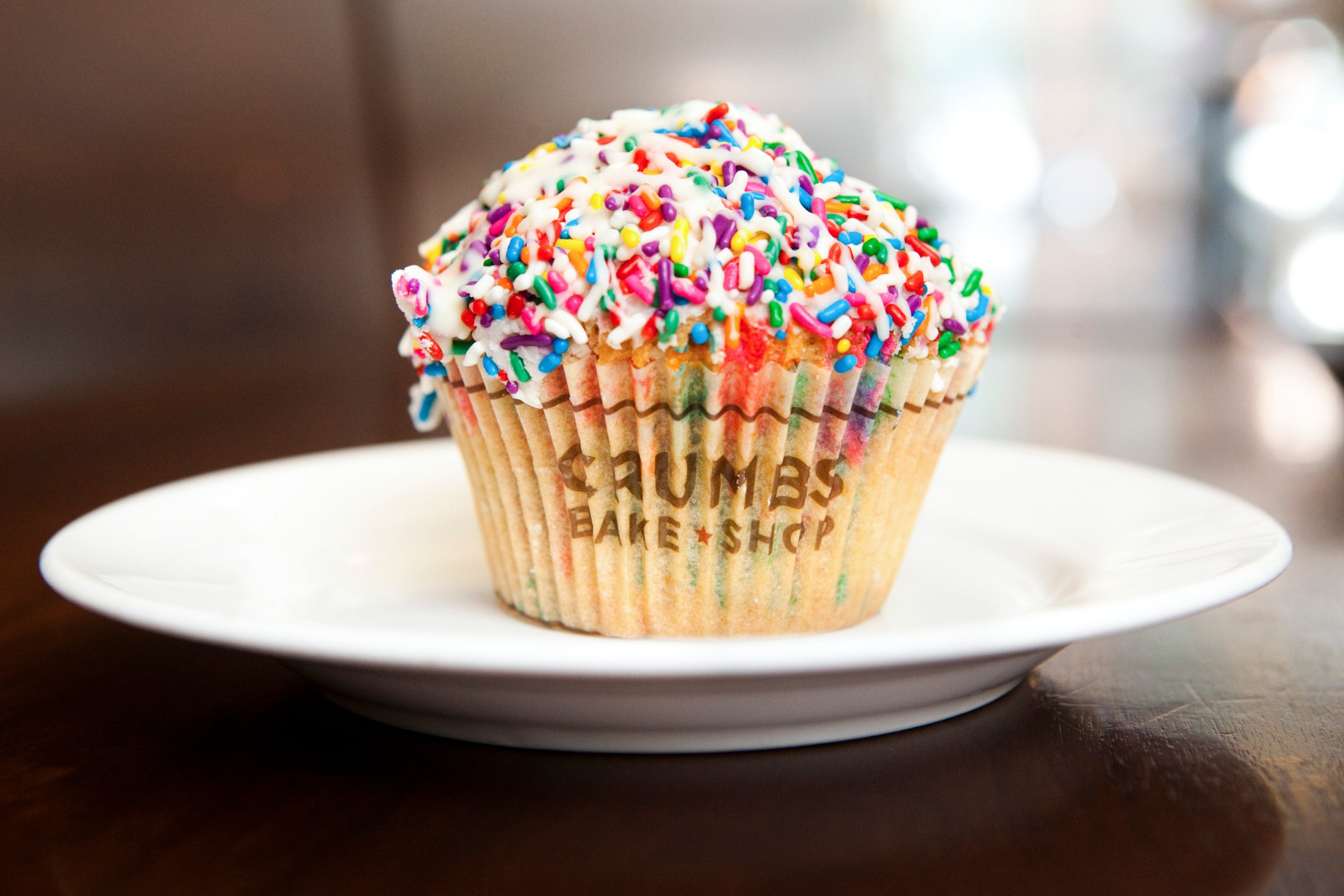
The Crumbs cupcake shop in my neighborhood just shut down. It’s a sad day for the entire sugar industry: Crumbs, a once-growing collection of shops with visions of becoming a national bakery chain, abruptly folded its 65-store operation in 12 states, putting hundreds of people out of work. The company had been delisted from NASDAQ last week, its stock trading for pennies from a high near $14. Sales were falling, Crumbs was losing money and unlikely to become profitable anytime soon. As of its last quarterly filing, the company had just $300,000 in cash on hand, and its liabilities included $244,000 in gift cards outstanding. Hope you didn’t own any of them. Crumbs lost $5 million in its last quarter.
Was Crumbs a victim of Americans turning toward eating healthier, especially among children, as the First Lady has encouraged? Fat chance. We are as plump and pleased as ever, and our appetite for donuts, cronuts, deep-fried Oreos and Baconators will not be reposing anytime soon. Long live junk food, if maybe not us.
But you could see this one crumbing long before it happened. Crumbs made good cupcakes—one of those sweet bombs could keep an 8-year old wired for about three days—but its failure isn’t so much about the product so much as the way Wall Street works to bake new companies. The recipe almost guarantees trouble in the future for many firms. Crumbs joins the long list of once hot food franchises that couldn’t resist the smell of growth and ultimately had difficulty managing it: David’s Cookies, Krispy Kreme, Einstein Bagels, World Coffee, just to name a few. They can survive, but generally after massive restructuring. Crumbs ran out of time and money.
The pattern is similar: a good product or idea becomes increasingly popular, and investors get moon-eyed about the prospects. At the same time, other operators and investors will swear to you that there’s plenty of room for more than one brand—or that if there isn’t much room, their concept is superior.
In the mid-90s, it was the humble bagel’s turn for the national spotlight. The players included Bruegger’s Bagel Bakery, Einstein Bros. Bagels, Chesapeake Bagel Bakery, Manhattan Bagel, Noah’s New York Bagels, Big Apple Bagels and the Great American Bagel among others. Several of them went public, which funded overexpansion. They dreamed big. “What happened to the pizza in the ’40s and ’50s is happening to the bagel today,” said the ceo of Manhattan Bagel at the time. “Soon there will be bagel shops on every street corner.” Except in Manhattan, where there are no Manhattan Bagel shops. Einstein, Noah, Chesapeake and Manhattan would eventually become part of one company, as the craze subsided and the industry consolidated. Then it was doughnuts. Krispy Kreme also got creamed by massive overexpansion funded by its very popular IPO. Even in the U.S., we can only eat so many doughnuts.
Cupcakes are now repeating the pattern, with predictable results. In the cupcake game, Crumbs competitors include Magnolia Bakery, Sprinkles, and any number of hipster-preneurs in major cities not to mention the likes of Duncan Donuts and Starbucks, which flanked the cupcake shops with offerings of their own. If cupcakes were that hard to make, your mom wouldn’t have churned them out on demand.
Why isn’t there more caution? Because that’s not Wall Street’s real concern. The investment industry’s mission is to throw money at enough startups—from cupcakes to social media—and hope to land on a winner. Failure is built in, the only question being who is going to take the losses. A lot of time it’s overeager shareholders who pile in these stocks because all they see is unlimited growth. In food, the best case scenario is Starbucks, whose original store still operates on Pike Street in Seattle along with thousands of others around the world. An IPO allowed Starbucks to enjoy rapid growth and made a lot of investors rich. But part of Starbucks strategy was to be capitalized enough to blow other rivals out of the water by grabbing the best locations. That left everyone else to scramble to remain competitive—and why there’s really no No. 2 in premium coffee.
Fortunately, the U.S. is not going to run out of cupcakes anytime soon. This is basically a mom and pop business that is still best run by mom and pop. Cupcakes may have had their run for now, but investors are always going to be hungry to find the next new food style to fund. And grilled cheese is waiting in the (chicken) wings.
More Must-Reads from TIME
- Breaking Down the 2024 Election Calendar
- How Nayib Bukele’s ‘Iron Fist’ Has Transformed El Salvador
- What if Ultra-Processed Foods Aren’t as Bad as You Think?
- How Ukraine Beat Russia in the Battle of the Black Sea
- Long COVID Looks Different in Kids
- How Project 2025 Would Jeopardize Americans’ Health
- What a $129 Frying Pan Says About America’s Eating Habits
- The 32 Most Anticipated Books of Fall 2024
Contact us at letters@time.com